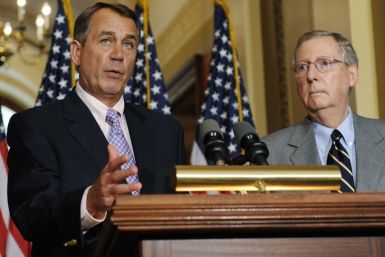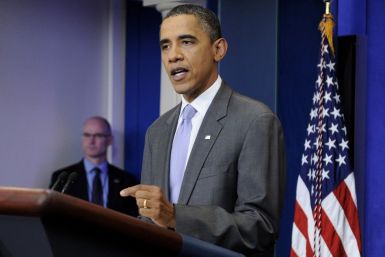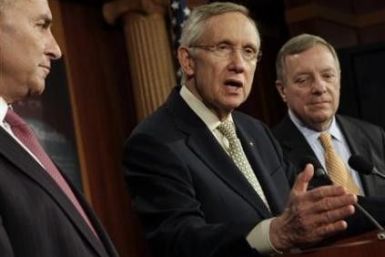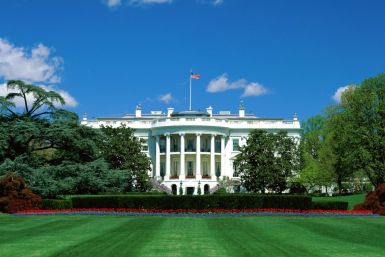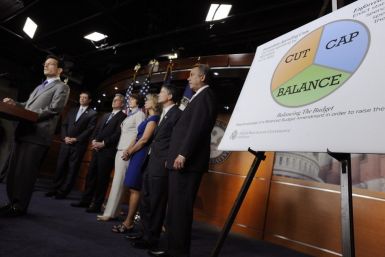The White House has one important tool in its arsenal to influence congressional talks over further deficit reduction measures in the coming months: the expiry of Bush-era tax cuts at the end of 2012.
After months of vitriolic discord, Republican and Democratic lawmakers were expected to vote on Monday on a White House-backed deal to raise the U.S. borrowing limit and avert an unprecedented default.
Congressional leaders and President Obama reached a deal to raise the federal debt ceiling in an effort to avoid the first U.S. default but a series of crucial votes in both chambers of Congress remain before the President can sign it into law.
A weary-looking President Obama told reporters late Sunday that a deal had been reached between the leaders of the White House, Senate and House of Representatives to raise the federal debt ceiling and avoid the first U.S. default, although a series of votes by all members in Congress is needed to make the ceiling raise a reality.
President Barack Obama said on Sunday that Democrat and Republican leaders had reached an agreement to reduce the U.S. deficit and avoid default, but it was not clear if the spending cuts were deep enough to stave off a credit rating downgrade. The White House said the compromise would cut about $2.5 trillion from the deficit over the next 10 years but the reductions would not happen so quickly that they would drag on the fragile U.S. economy.
President Barack Obama told reporters Sunday that a deal has been reached to raise the federal debt ceiling and avoid the first U.S. default, the culmination of days of high-level, high-stakes political wrangling to attempt to resolve the nation's large deficits.
Senate Majority Leader Harry Reid has "signed-off" on a debt-raising deal that could be voted on as early as tonight, although the Senate's Republican leadership indicates a deal has not been reached yet as the U.S. attempts to avoid the first-ever default on debt by the U.S. government.
A deal to raise the federal debt ceiling and avoid the first ever U.S. default is "very close," but House Democratic Leader Nancy Pelosi said Sunday there is a chance they may not pass it.
The Senate failed to advance Harry Reid's debt-ceiling plan, but leaders from both sides remained optimistic Sunday a deal can be reached before the Aug. 2 deadline to raise the U.S. debt ceiling.
Senate Majority Leader Harry Reid, D-Nev., is pushing ahead with a Senate vote on his debt plan, but the GOP votes are not there. Still, Republican Majority Leader Mitch McConnell said Sunday negotiators were "very, very close" to a deal.
Senate Republican leader Mitch McConnell said Sunday negotiators were "very, very close" to a deal to raise the debt ceiling. But Democratic leaders remain cautious. The deal is not done, they say.
It was John Lennon who said there are no problems, only solutions, and on Sunday Congressional Democrats and Republicans continued to work on a bill that would avert a dreaded U.S. Government default. If the two sides continue to make progress, a vote on the bill could occur as early as Sunday night.
Congress is "very, very close" to a debt ceiling deal, according to Senator Mitch McConnell. Negotiators are discussing final details, and the deal is not done yet, but they say its close.
Hopes emerged that lawmakers were close to a last-minute deal on Sunday that could raise the debt ceiling by up to $2.8 trillion and assure financial markets that the United States will avoid default.
Even though the congressional leaders had all the time in the world to strike a deal on the issue of debt-ceiling raise, they seem to be shamelessly waiting for an 11th hour drama. Technically speaking, Aug. 2 is the end of grace period for extraordinary measures and the U.S. borrowing limit, currently at $14.29 trillion, was reached on May 16 this year. Instead of getting things done Democrats and the Republicans seem to get a kick out of the 'blamestorming game'.
After two weeks of acrimony, Democrats and Republicans, perhaps after having stared into the abyss, returned to the bargaining table Saturday. Still, no one will believe the issue has been resolved until President Barack Obama signs a bill that raises the debt ceiling and cuts the budget deficit.
Top level negotiations will continue until Sunday afternoon at one p.m. after Senate Majority leader Harry Reid delayed a test vote on a Democratic debt ceiling increase plan.
Top congressional Republicans said on Saturday they were in serious talks with President Barack Obama to break a U.S. debt limit deadlock and were confident the risk of default by the world's largest economy could be avoided.
The White House said on Saturday it "strongly supports" a bill being considered in the House of Representatives that incorporates both Democratic and Republican ideas and would raise the debt limit to early 2013.
The debt negotiations are getting down to the wire. Republican and Democratic lawmakers are scrambling to broker a deal to raise the country's $14.3 trillion debt ceiling before Tuesday, when the Treasury will no longer be able to borrow funds to meet all of its obligations. It all means the United States could face the possibility of defaulting on its debt and losing its prized triple-A credit rating.
A bitter mood prevailed on Capitol Hill as lawmakers struggled on Saturday to find a compromise measure to lift the nation's $14.3 trillion debt limit three days before the deadline to avert a ruinous default.
Led by Majority Leader Harry Reid, D-Nev., Senate Democrats Saturday worked feverishly to modify Reid's original debt plan in order to attract Senate Republicans. But a GOP Senate filibuster is expected late Saturday or Sunday, which, if it holds, would leave the U.S. without a debt ceiling increase, two days before a default.











